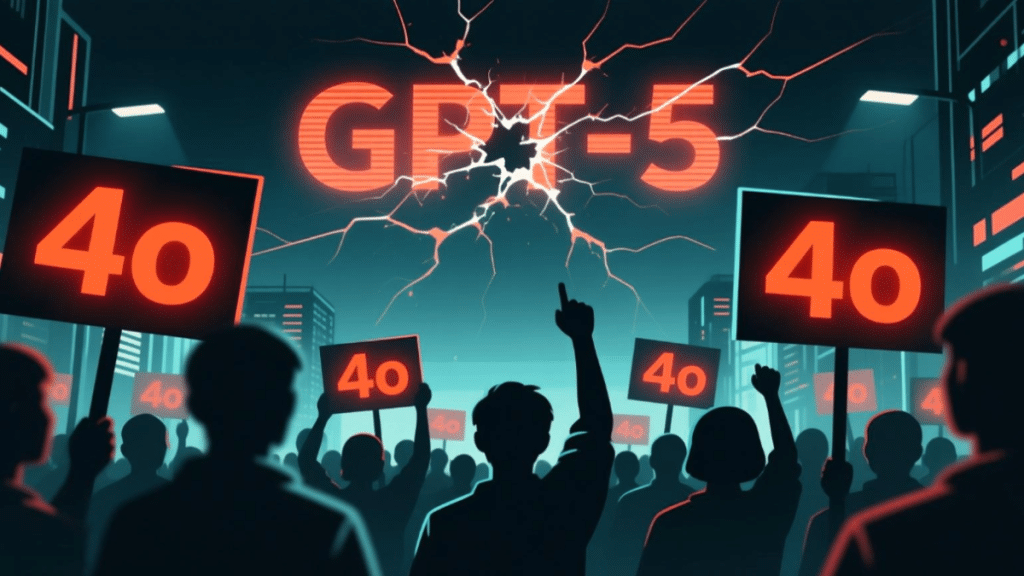When OpenAI released GPT-5, it was billed as the most advanced model yet — more precise, more powerful, and a step beyond everything the company had shipped before. Developers, marketers, and founders rushed to test it, expecting a leap in capability.
But within days, frustration spread. Reddit threads exploded with complaints. Users said GPT-5 often stumbled on simple logic, gave dry robotic answers, and failed to adjust tone during conversations. For many, the promise didn’t match the reality. And that’s when a surprising shift began: people started migrating back to GPT-4o, the older model many now call OpenAI’s most reliable.
A Developer’s Disappointment With GPT-5
One backend developer shared how GPT-5 slowed his workflow instead of speeding it up. He asked it to generate database migration scripts — something GPT-4o had handled smoothly — but GPT-5 produced code with structural errors. Fixing those errors cost him hours.
He described the experience bluntly: “GPT-4o felt like a partner. GPT-5 felt like an intern who skimmed the docs but didn’t test anything.”
Why Marketers Abandoned GPT-5
Marketing teams also felt the gap. One strategist tested GPT-5 for campaign copy. The output was grammatically correct but flat, missing tone and personality. In contrast, GPT-4o generated lines that felt conversational and brand-appropriate.
Clients noticed. Engagement dropped when GPT-5 was used. The strategist reverted to GPT-4o and saw immediate recovery in open rates and click-throughs.
GPT-5 on Reddit – The Patterns of Complaints
Reddit communities became a living archive of GPT-5’s struggles. Posts ranged from memes mocking its “robotic” voice to long technical breakdowns of faulty outputs.
The main complaints were consistent:
- Too dry – responses lacked warmth or adaptability.
- Logic gaps – basic reasoning tasks sometimes failed.
- Inflexibility – ignoring conversational context.
- Overconfidence – wrong answers stated with certainty.
By midweek, thousands of upvoted comments called GPT-4o the “real flagship.”
Why GPT-4o Still Wins
Despite being older, GPT-4o has a balance that resonates with everyday users. It might not have GPT-5’s ambitious architecture, but it delivers:
- Natural conversational tone.
- High accuracy on coding tasks.
- Better adaptability across creative and professional prompts.
- Lower error rate in multi-step reasoning.
For many, reliability beats novelty.
Chatronix – Turning AI Chaos Into Clarity
A Smarter Way to Compare Models
This backlash led some professionals to rethink how they test AI tools. Instead of jumping between GPT-5, GPT-4o, Claude, or Gemini separately, they started using Chatronix — a workspace that integrates six models in one chat.
The biggest breakthrough? Turbo mode with One Perfect Answer. Chatronix automatically compares outputs from all six models and merges them into a single, polished response. That means you don’t waste time hunting for the least-broken reply.
- 6 models in one chat
- 10 free queries to start
- Turbo mode with One Perfect Answer
- Instant cross-model comparisons
Table: GPT-4o vs GPT-5 (User Perspective)
| Feature | GPT-4o | GPT-5 |
| Conversational tone | Natural, adaptive | Dry, robotic |
| Coding reliability | High | Error-prone on simple tasks |
| Marketing copy | Engaging, brand-friendly | Flat, generic |
| User satisfaction | 8.5/10 | 5/10 |
What Founders Learned From the Shift
One startup founder summed it up after testing GPT-5 for pitch deck creation: “It was fast, but it missed the heart of the story. GPT-4o gave me slides that felt alive.”
The lesson is simple: the newest model isn’t always the best. For now, GPT-4o remains the go-to for creators, builders, and marketers who can’t afford mistakes.
Bonus Prompt
The marketer’s favorite line when comparing outputs:
“Run this request through GPT-4o, GPT-5, and Claude. Summarize the strengths and weaknesses of each output in plain English.”
It exposed gaps instantly.
The Takeaway
GPT-5’s rocky start is a reminder: hype doesn’t guarantee usefulness. For many users, GPT-4o is still the smarter choice — until OpenAI fixes GPT-5’s flaws.
And for professionals who don’t want to gamble on single models, Chatronix offers the clarity GPT-5 failed to deliver.
That’s the real trend now: not chasing the shiniest tool, but finding what actually works.
